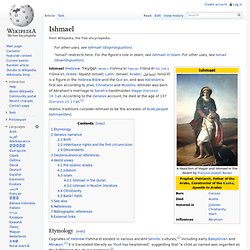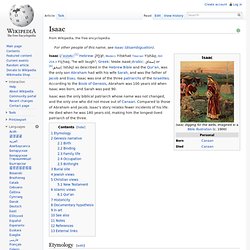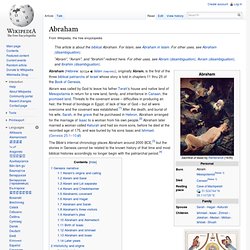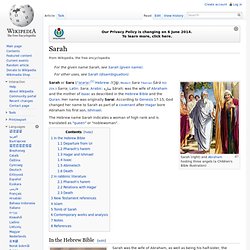

Ishmael. Islamic traditions consider Ishmael to be the ancestor of Arab people (Ishmaelites).

Etymology[edit] Genesis narrative[edit] This is the account of Ishmael from Genesis Chapters 16, 17, 21, 25 Birth[edit] Inheritance rights and the first circumcision[edit] When he was 13 years old, Ishmael was circumcised at the same time as all other males in Abraham's house becoming a part of the covenant in a mass circumcision. At the time of the covenant, God informed Abraham that his wife Sarah would give birth to a son, which he was instructed to name Isaac. A year later, Ishmael's half-brother Isaac was born to Abraham by his first wife Sarah. On the day of feasting during which Abraham celebrated the weaning of Isaac, Ishmael was “mocking” or "playing with" Isaac (the Hebrew word is ambiguous[5])[1] and Sarah asked Abraham to expel Ishmael and his mother, saying: "Get rid of that slave woman and her son, for that slave woman's son will never share in the inheritance with my son Isaac.
Isaac. Isaac was the only biblical patriarch whose name was not changed, and the only one who did not move out of Canaan.

Compared to those of Abraham and Jacob, Isaac's story relates fewer incidents of his life. He died when he was 180 years old, making him the longest-lived patriarch of the three. Etymology[edit] Genesis narrative[edit] Birth[edit] An angel prevents the sacrifice of Isaac. It was prophesied to the patriarch Abraham that he would have a son and that his name should be called Isaac. On the eighth day from his birth, Isaac was circumcised, as was necessary for all males of Abraham's household, in order to be in compliance with Yahweh's covenant.[9] Binding[edit] At some point in Isaac's youth, his father Abraham brought him to Mount Moriah.
Family life[edit] Abraham. Abraham (Hebrew: אַבְרָהָם Abram was called by God to leave his father Terah's house and native land of Mesopotamia in return for a new land, family, and inheritance in Canaan, the promised land.

Threats to the covenant arose – difficulties in producing an heir, the threat of bondage in Egypt, of lack of fear of God – but all were overcome and the covenant was established.[1] After the death, and burial of his wife, Sarah, in the grave that he purchased in Hebron, Abraham arranged for the marriage of Isaac to a woman from his own people. Abraham later married a woman called Keturah and had six more sons, before he died at the recorded age of 175, and was buried by his sons Isaac and Ishmael.
(Genesis 25:1–10) The Bible's internal chronology places Abraham around 2000 BCE, but the stories in Genesis cannot be related to the known history of that time and most biblical histories accordingly no longer begin with the patriarchal period. Genesis narrative[edit] Sarah. Sarah (right) and Abraham hosting three angels (a Children's Bible illustration) The Hebrew name Sarah indicates a woman of high rank and is translated as "queen" or "noblewoman".

In the Hebrew Bible[edit] Abram’s Counsel to Sarai (watercolor circa 1896–1902 by James Tissot) Sarah was the wife of Abraham, as well as being his half-sister, the daughter of his father Terah.[2] Sarah was ten years (or less) younger than her husband.[3] She was considered beautiful to the point that Abraham feared that when they were near more powerful rulers she would be taken away and given to another man. Departure from Ur[edit] Pharaoh's harem[edit] There was a severe famine in the land of Canaan, so that Abram and Lot and their households, travelled south to Egypt.
Hagar and Ishmael[edit] Banishment of Hagar, Etching. After having lived in Canaan for ten years and still childless, Sarai suggested that Abram have a child with her servant Hagar, to which he agreed.